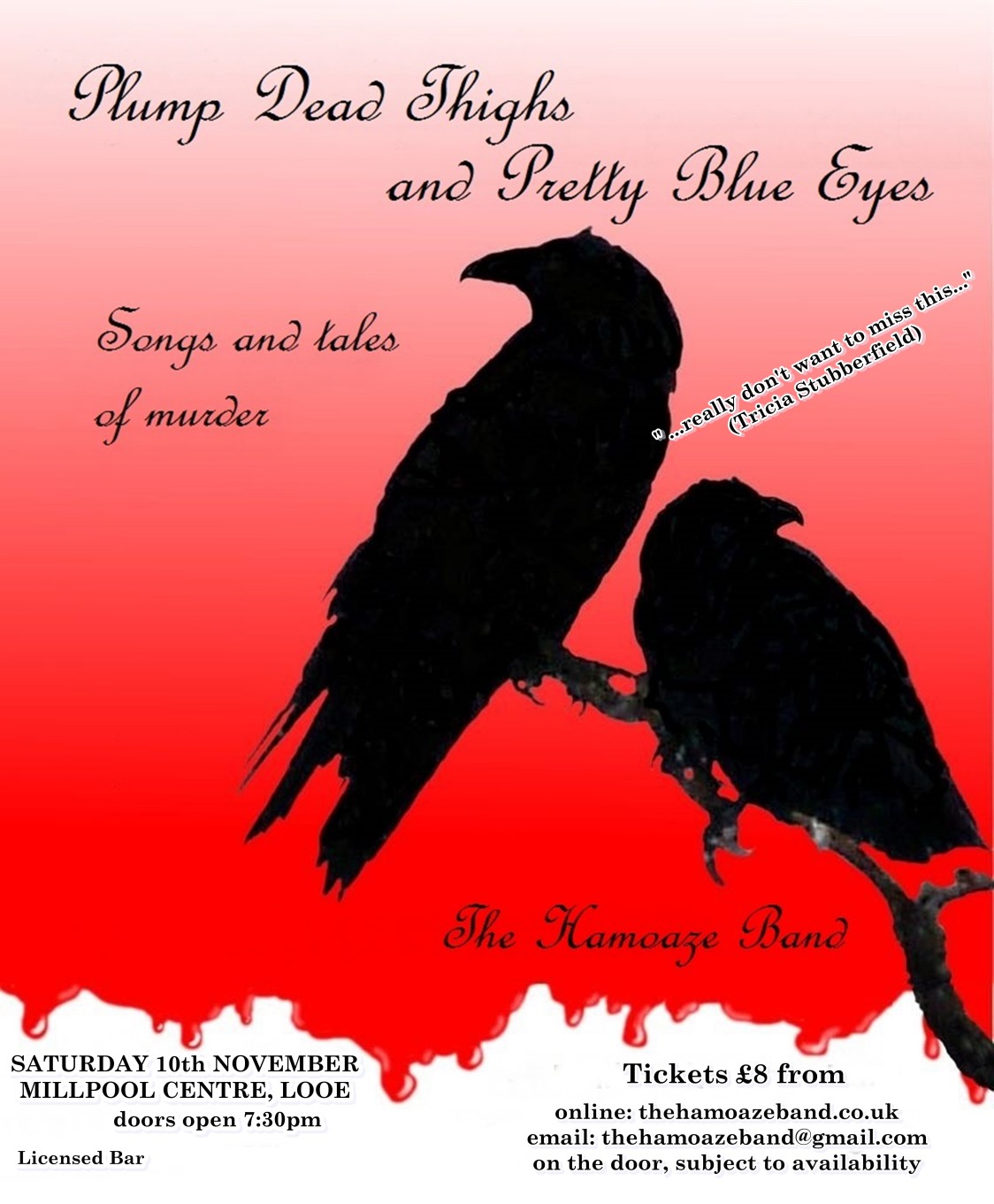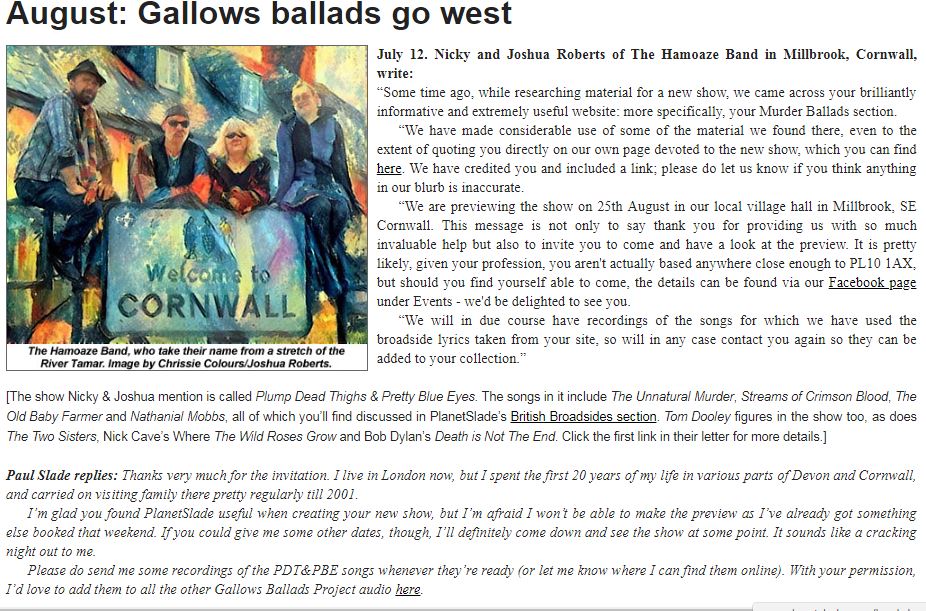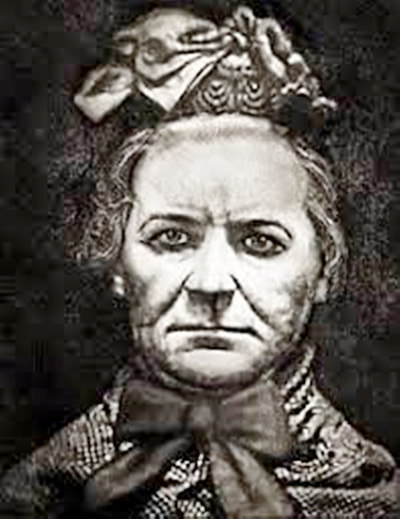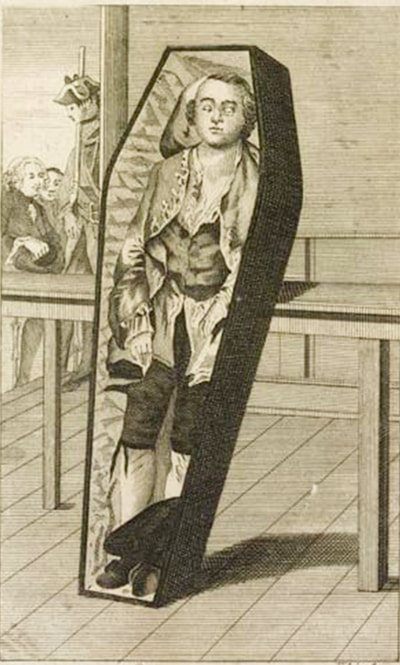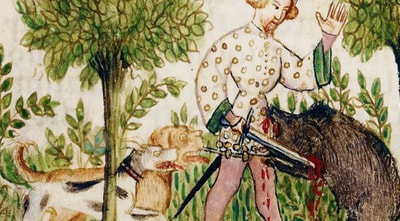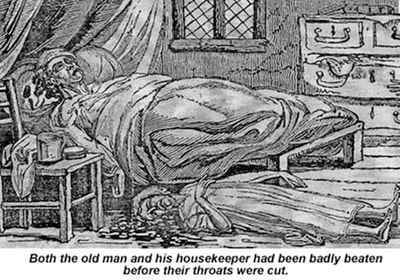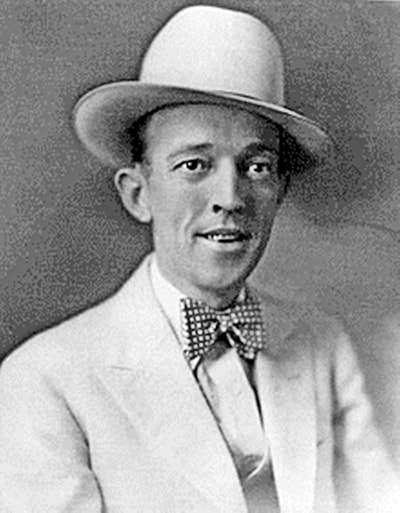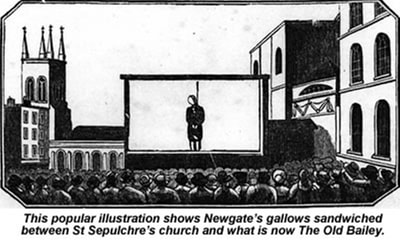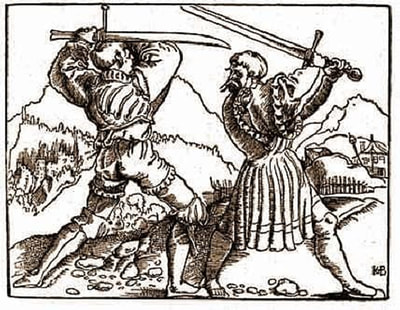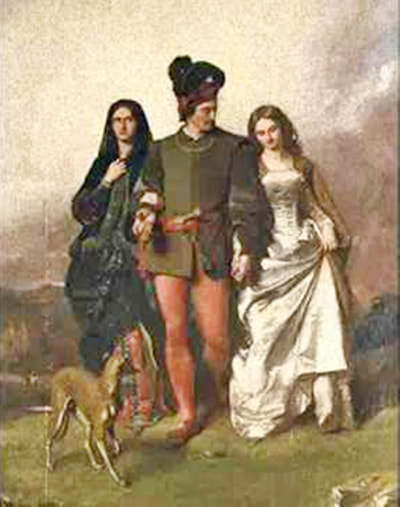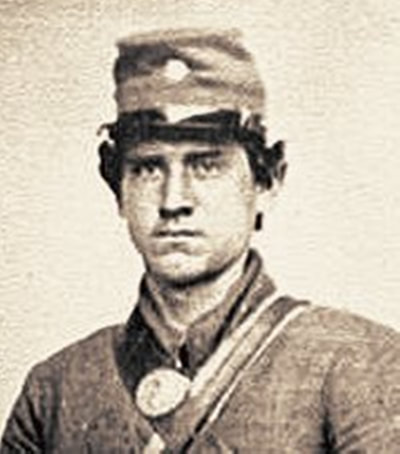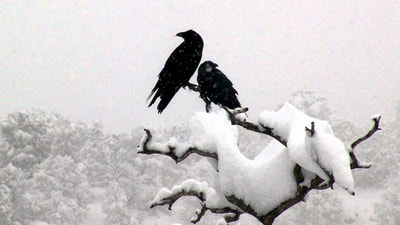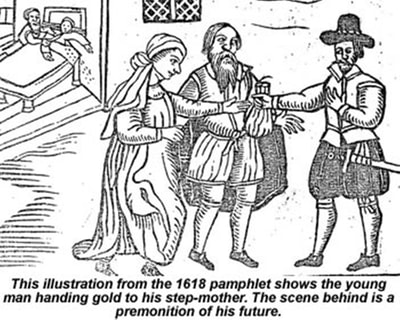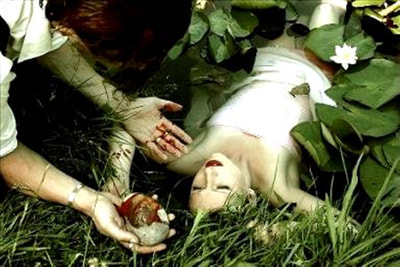The Hamoaze Band info and tickets Millpool Centre: Sat 10th Nov 2018 Doors open 7.30pm
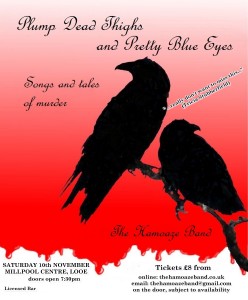
Plump Dead Thighs & Pretty Blue Eyes
We have a brand new show from August 2018. Plump Dead Thighs and Pretty Blue Eyes takes its title from a line in the traditional murder ballad The Two Ravens (or, as it’s known in Scotland, The Twa Corbies).
The show is a mixture of concert and theatre, all based on the great tradition of the murder ballad. There have been songs of murder for thousands of years and their history has made for fascinating reading during our research for this show.
The songs that have made it to the cut are listed below along with a little of their histories; we are hugely indebted to planetslade.com, a veritable treasure trove of knowledge on the subject run and edited by Paul Slade.
The Two Sisters: this song dates back at least as far as Viking times in the UK and has variants throughout the world. Arguably, its best known version is by Pentangle on their 1970 album The Cruel Sister, which is the title they used for the song itself. The version we perform is similar to Pentangle’s in that it’s a working song used to provide rhythm to repetitive tasks, in this case the manufacture by hand of bezums from the wild broom that grew on the hills of North East England. Hence the repeated line “Lay the bent to the bonny broom” which refers to the action of weaving the “bent” or cross-weave of broom at the head of the bezum to hold it together.
The Unnatural Murder: this is a true story that happened in the seventeenth century in the Cornish village of Penryn. A young man (boy) left home to go to sea, returning many years later as a wealthy man to share his new found riches with his family. His decision to remain in disguise rather than immediately to tell his parents who he was proved a fatal mistake. The lyrics are taken from an undated Victorian broadside which, more or less, claimed the story as contemporary to its publication (not much change in attitudes to accurate reporting in the popular press has happened since, it would seem!) The original melody to these lyrics has been lost; our version weaves a very well-known traditional tune with a new melody written by Joshua.
Streams of Crimson Blood: another true story in which a young man murdered an old man (Mr Langtry) and his housekeeper after entering their house late one night with the intent of robbing them of any valuables he might find. John Stacey was the young murderer and there would appear to be little or no doubt as to his guilt. He was hanged for the crime on 3rd August 1829. “So great was local outrage at Stacey’s crime that a temporary gallows was set up opposite the Langtry house in Prospect Road so that he could be executed at the scene of the crime.” (P Slade). The lyrics of this ballad are taken from a contemporary broadside written and published by Thomas Birt of Seven Dials. Again, the original melody has been lost; our melody was written by Joshua.
The Old Baby Farmer: Amelia Dyer was, almost undoubtedly, a woman with severe mental health problems. She was probably clinically insane. This, undoubtedly, doesn’t excuse her crimes but equally should probably have kept her from the gallows. It did not; she was hanged in 1896. Mrs Dyer was a baby farmer – a surprisingly common way of making a living in Victorian times and even well into the twentieth century. The idea was that young “fallen” women would pay a baby farmer to look after their illegitimate child – a way to keep the child safe and cared for whilst the natural mother could work for a living and might avoid the “disgrace” of being known to have had a child out of wedlock. Normally that’s exactly what happened. Amelia Dyer, however, made something of a habit of taking the money and the baby before quietly doing away with the infant and dumping the body into the Thames. It is estimated that she probably killed forty or so infants; she was eventually convicted of the murder of four of them. The lyrics for this song are taken from an undated broadside of the late 19th century; the original melody has been lost, so our melody was written by Nicky.
Son David: a traditional Scottish ballad which has many variants, including several from Scandinavia. This version is a conversation between a mother and her son, who it turns out has killed his brother; arguably for very good reason. The song refers to a “holly bush” that will “never grow to tree.” It’s almost certain that this means an unborn baby. It has been conjectured by much better qualified people than us that the dead brother has been killed by the eponymous Son David in a fight after being discovered to be the father of this “holly bush” in an incestuous relationship with their sister. David, as a result, will take his leave forever from his mother and homeland by setting his “foot in a bottomless boat” or, as we might more accurately refer to it, doing himself in. Delightful, no?
Bold Sir Rylas: a relatively modern variant of the much older ballad Sir Lionel (Roud 29, collected by F J Child). “Modern variants of this ballad show the degree to which a ballad can degenerate with the passage of time. The original ballad of Sir Lionel was, in all probability, based on the courtly romance of Sir Eglamour of Artois, though the ballad story has been so garbled that it is barely recognisable today. Its degeneration, perhaps through stage influence, has resulted in its current status as a comic burlesque…” (https://mainlynorfolk.info/lloyd/songs/boldsirrylas.html). We have certainly taken the comic burlesque elements in our version which is based on the arrangement by Boden and Spiers (formerly of Bellowhead.)
Nathaniel Mobbs: another true story – Mr Mobbs was, by all accounts, not someone you’d particularly want as your next door neighbour. He was a cooper in Whitechapel, a man with a distinct alcohol problem and a very violent temper. It is commonly thought that he might well have killed his first wife, indeed he was questioned about it, but that death was eventually recorded as an accident. Mobbs remarried, having wooed a young woman called Caroline. By contemporary accounts from neighbours in Goodman’s Yard, theirs was a tempestuous relationship with frequent loud and violent quarrels. Caroline Mobbs often found herself taking refuge with neighbours to escape the worst of her husband’s abuse. It was during one such episode that Mobbs forced entry into his neighbour’s lodgings and dragged Caroline to their own rooms. She was never seen alive again. Mobbs was publicly hanged in 1853 in front of Newgate prison. The lyrics to this ballad are taken from a broadside sold at the execution (so the baying mob could sing it at him as he climbed the scaffold). The original tune was probably a simple and well known folk tune but has again been lost; our version has music by Joshua.
Gamblin’ Bar Room Blues: opening up the second half of the show, this old blues song from 1932 was written by Jimmie Rodgers (1897-1933) and tells the somewhat garbled story of a drunken evening that ends in only half-remembered violence, the perpetrator being extremely drunk throughout. Our version borrows heavily from an arrangement recorded in 1976 by The Sensational Alex Harvey Band and released as a single from the album The Penthouse Tapes.
Henry Lee: a song performed by its composer, Nick Cave, alongside P J Harvey on Cave’s 1996 album Murder Ballads. Cave drew heavily from the traditional ballad Young Hunting (Roud 47) in his
